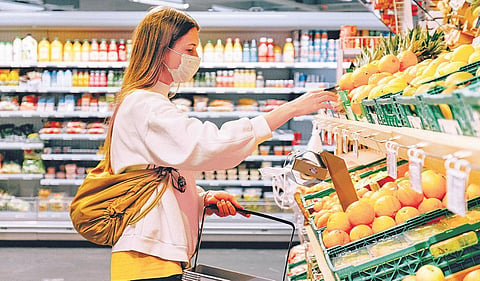

CHENNAI: The global pandemic has turned our lives upside down. Billions around the globe are house-bound, social contact is off-limits and an invisible virus makes us look like a society of suspicious, masked vigilantes. No surprise, then, that sustainability and being green aren’t exactly a priority for many right now. However, we don’t have to abandon our green habits during the crisis. We are continuously gaining insight about the virus and how it interacts with various surfaces. So, let us review a few learnings from around the world on how to still maintain some of our green behaviour during what seems to be our only social outing nowadays — a trip to the grocery store!
There’s a common perception that packaged foods are cleaner and more sanitised, and research firm Bloomberg NEF pointed out in a mid-March report that ‘Concerns around food hygiene due to COVID-19 could increase plastic packaging intensity’. This may not necessarily be true though — “Plastic does not inherently make something clean and safe,” said Ivy Schlegel, a research specialist for Greenpeace USA. Schlegel pointed out that several studies, including the one published on March 17 in the New England Journal of Medicine found that ‘The virus will persist on plastic longer than almost any material examined [up to three days in laboratory conditions], which could call into question the safety of the majority of plastic-packaged items in supermarkets’.
That means we can still choose glass or cardboard packaging over plastic. While stores are making masks compulsory and having accessible hand sanitisers everywhere for customers, they are also wiping down and disinfecting surfaces like door handles, shopping carts and checkout card terminals. However, it’s highly unlikely that staff have time to clean every package of atta or bottle of sauce on their shelf. Some sources suggest that purchased products be left in a separate box in an out-of-the-way place for three days, to allow any traces of the virus to die off. Fresh produce that will be eaten raw can be scrubbed with a vegetable brush and plenty of water. Vegetarian meals will also reduce the number of trips to the supermarket to buy fresh meat.
Vegetarian and vegan diets generally have a lower carbon footprint than those that favour meat. Another great option is to check out any local produce from smaller organic farmers in your area. Even better if you do grow some vegetables and herbs by yourself. The other question on our minds is about our reusable bags and containers. What are the eco-friendly options? Where cloth bags are still allowed, it’s probably fine to keep using them.
The US Centers for Disease Control and Prevention (CDC) says, based on current research, that it ‘may be possible’ to be infected with COVID-19 from a surface or object with the virus on it, but ‘this is not thought to be the main way the virus spreads’. But to err on the side of caution, bags should be washed after every use and kept in a separate place at home once groceries have been unloaded. Please note that all these habits must be considered along with the official recommendations that have stressed the importance of maintaining distance and staying home, if possible — and, of course, proper hand-washing with soap and water for at least 20 seconds.
Pavitra Sriprakash @pavisriprakash